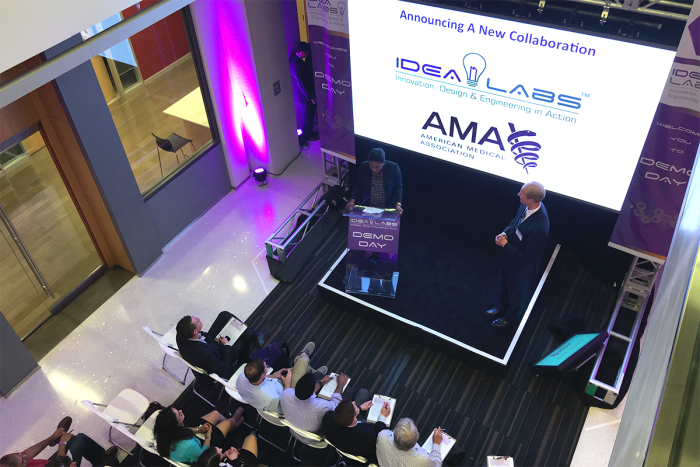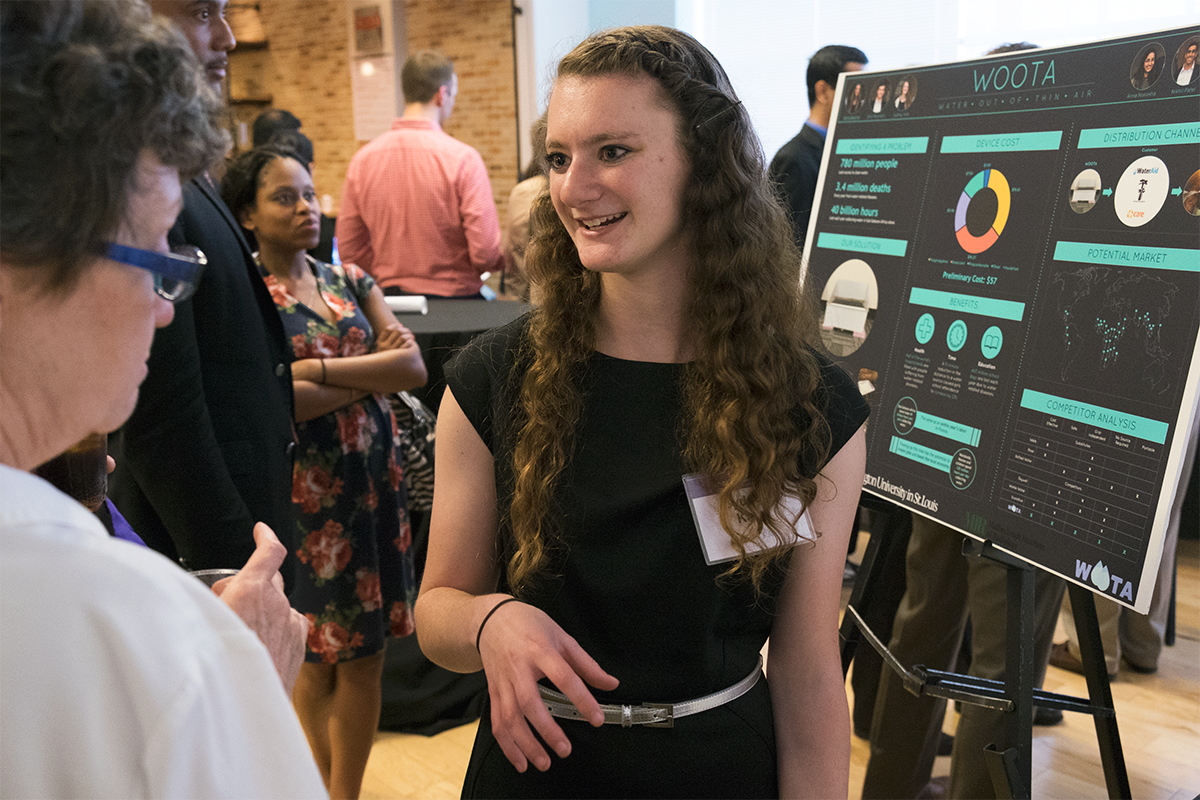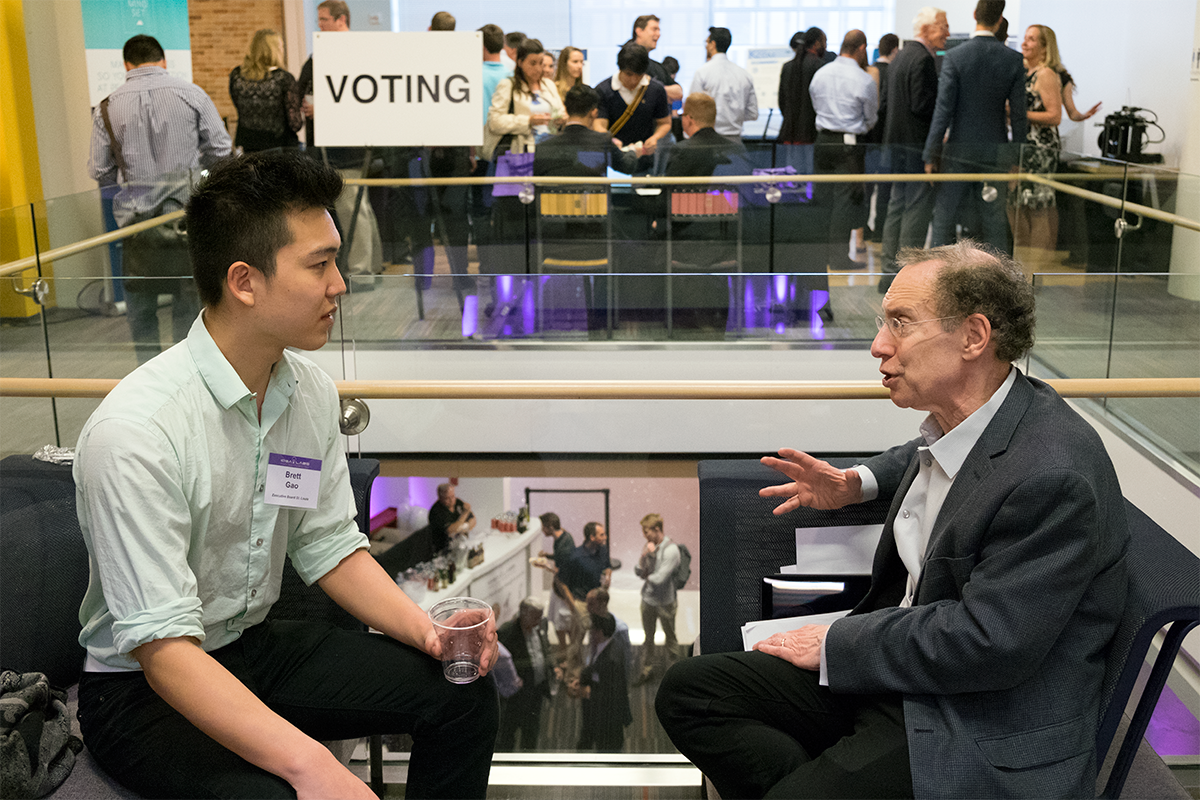American Medical Association to collaborate with IDEA Labs
Student-run group will expand national reach through partnership aimed at supporting medical technology development
 Allison Braun
Allison BraunRowsha Labranche, (left) product development manager at the American Medical Association (AMA), announces the AMA's partnership with IDEA Labs, a student-led bioengineering and design incubator started at Washington University in St. Louis. Labranche is joined by IDEA Labs president and MD/PhD student Stephen Linderman.
IDEA Labs, a student-run bioengineering and design incubator started at Washington University in St. Louis, will expand its national reach through a partnership with the American Medical Association (AMA). The collaboration is aimed at supporting cutting-edge medical technology development from the next generation of young entrepreneurs.
The collaboration was announced Monday, April 25, at an IDEA Labs event at CIC St. Louis, in the CORTEX Innovation District. Teams of medical, engineering and business students presented solutions to real-world clinical problems at the event.
“It’s gratifying to see that IDEA Labs has drawn the attention and support of the AMA through the hard work and inspiring entrepreneurship of Washington University students,” said David H. Perlmutter, MD, executive vice chancellor for medical affairs and dean of the School of Medicine. “Not only will this partnership benefit the students, it will help spur similar initiatives at other universities. And that will lead to more problems being solved in health care and more patients’ needs being met — and in the most creative of ways.”
The AMA’s CEO and executive vice president, James L. Madara, MD, said of the collaboration in a news release: “Innovation is a key driver in making the health system work better for everyone. The AMA looks forward to working together with IDEA Labs to help young entrepreneurs identify and understand key challenges in modern medicine and inspire innovation that will deliver meaningful solutions for patients and physicians.”
Stephen Linderman, an MD/PhD student at Washington University and president of IDEA Labs, said the group relies on teamwork with health-care providers to create impactful new technologies.
“We look forward to collaborating with the AMA to spread the IDEA Labs model to more institutions and clinicians,” Linderman said. “By bringing together top universities across the country, connecting budding companies with the talent, mentors and investors needed to thrive, this new collaboration will accelerate medical technology development and entrepreneurial education.”
Students at Harvard-MIT, the University of Pennsylvania and the University of Minnesota formed IDEA Labs chapters after learning of Washington University students’ previous successes. Students from the various chapters convened in St. Louis on April 25 to share their ideas, making it IDEA Labs’ first “Demo Day” involving students outside of Missouri.
 Sid Hastings
Sid HastingsIDEA Labs teams have addressed a wide range of issues presented to them by medical professionals, including the topics of in vitro fertilization (IVF), colon cancer and poor nutrition. Among potential solutions offered by IDEA Labs teams: a method to increase IVF success rates by 30 percent that optimizes sperm’s speed, shape and chemical attractiveness; a test to reduce colon cancer rates by measuring biomarkers in stool samples; and a platform that promotes healthier eating habits by allowing shoppers to interact with grocers through a Netflix-like automated grocery recommendation system.
Among the new technologies presented at this year’s Demo Day was Memento, a digital questionnaire about cognitive function that was developed in partnership with the university’s Charles F. and Joanne Knight Alzheimer’s Disease Research Center to accelerate the flow of information between Alzheimer’s patients, their caregivers and neurologists. Another new technology called SpideySense was inspired by the uncanny ability of pro-level quarterbacks to sense that something is behind them. It’s a sensor-packed neck wrap that alerts the wearer of imminent rear impact.
One of the most notable concepts to come out of IDEA Labs is Epharmix, an automated messaging system that uses calls or text messages to help manage patients’ conditions. Its system designed for dialysis patients and tested during a six-month pilot project on the Medical Campus has been particularly successful.
“IDEA Labs has resulted in exactly what we hoped to see, which was engineering being fundamental to the advancement of medical technology,” said Aaron Bobick, dean of the School of Engineering & Applied Science at Washington University. “Going forward, that coupling with the School of Medicine increases both the impact and visibility of what we do.”
The new partnership with IDEA Labs underscores the AMA’s expanding role in supporting health-care innovation. The AMA is ramping up efforts to bridge the gap between creative idea development and the realities of patient care, and working to forge new paths that expand the bounds of science, enhance patient care and improve the nation’s health.
At the Demo Day event, Rowsha Labranche, product development manager at the AMA, highlighted IDEA Labs’ role in its “health innovation ecosystem” to support entrepreneurship.
“We’re committed to innovation and creating a new entrepreneurial culture that will help us advance our ongoing work on behalf of our nation’s physicians and medical students,” Labranche said. “With IDEA Labs, we hope to collaborate to expand the national network and build the clinical problem database, which will aggregate clinical needs in areas of opportunity for the health-care community.”
 Sid Hastings
Sid Hastings





